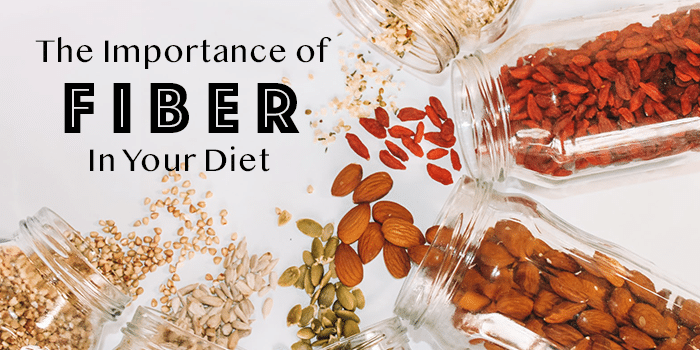 5-star Fitness
5-star Fitness
 5-star Fitness
5-star Fitness

Fiber – it’s part of our diet, and we all know it’s important… but why is that? You may be surprised how beneficial fiber is – especially when it comes to heart health. Take a quick read, and learn all about the importance of fiber in your diet…
The Importance Of Fiber In Your Diet: What The Heck Is Fiber?
First off, dietary fiber includes parts of plant foods that your body can’t digest or absorb. What that means is that fiber passes relatively intact through your stomach, small intestine, colon, and eventually, out of your body. There are two types of fiber: soluble and insoluble. Soluble fiber dissolves in water and creates a type of gel-like material which can help to maintain healthy blood cholesterol and blood sugar levels. Insoluble fiber is responsible for promoting movement through the digestive system, increasing stool bulk, and by binding with water making stools softer and easier to pass… if you have spongy stools you’re doing good! Fiber is first and foremost known to help promote regularity. Having regular bowel movements that aren’t painful is a great sign that you’re eating the right foods and getting enough fiber in your diet.
The Importance Of Fiber In Your Diet: Recommended Intake
The Importance Of Fiber In Your Diet: Maintain Healthy Blood Sugar Levels
There are many benefits to a high-fiber diet – we’re talking about whole-body wellness kind of benefits! Did you know that dietary fiber prolongs digestion making you feel fuller longer? Bonus: By prolonging digestion, fiber delays the movement of food into the small intestine. In doing so, your body is able to process carbohydrates at a slower rate which helps to regulate blood sugar levels and improve glucose tolerance, which is great for individuals with Metabolic Syndrome.
The Importance Of Fiber In Your Diet: Cardiovascular Health
The role of fiber helping to prevent heart disease is thought to stem from its ability to lower both blood pressure and cholesterol. Studies have also shown an association between high fiber intake and lower triglyceride levels. Fiber gels up and captures bile in the intestines (bile contains cholesterol) and carries it all the way through the excretion process. The reason this process helps to maintain healthy cholesterol levels is because bile acids are created in the liver and then secreted into the G.I.(gastrointestinal) tract to help the body with fat absorption. Once bile is captured by the gel-like fiber, it becomes unable to perform its job. The gel bulking helps reduce the amount of bile and cholesterol that get reabsorbed in the large intestine, so the liver must produce more bile which uses more stored cholesterol helping to diminish reserves… which makes this a great way to help balance and maintain healthy cholesterol levels.
The Importance Of Fiber In Your Diet: Weight Control
Studies have shown that people who eat a diet higher in fiber weigh less than those who consume less fiber. Foods rich in fiber are usually more filling, take longer to eat, and are lower in fat and total energy (kcals). Once eaten, high fiber foods take longer to leave the stomach in order to be digested and absorb water causing a feeling of fullness. Not only does fiber help you to manage a healthy weight, but eating a diet with high quality fiber can also help to maintain a healthy gut microbiome! Having a healthy and balanced microbiome plays an important role in digestion, absorption, and assimilation of all your foods – don’t let any of those nutrients go to waste! Fiber plays an important role in weight management, so be sure to include foods rich in fiber in your daily diet. You can find that list at the end of this blog.
The Importance Of Fiber In Your Diet: Start Slow
A diet high in fiber sounds like something we can all focus on – I mean, look at all the great things fiber does for us! We all want to be our happiest, healthiest selves, but you’re going to want to introduce fiber into your diet in smaller increments if you’re not used to a high-fiber diet. Staying hydrated when taking fiber supplements is key – if you don’t increase your water intake to match your fiber intake you can experience bloating, gas, and even hard and more difficult to pass stools. When introducing fiber into your diet is it best done steadily, over the course of a few weeks.
The Importance Of FIber In Your Diet: An Apple A Day…
It seems there is some stock in the old adage… “An apple a day keeps the doctor away.”
While we do recommend routine check-ups with your physician, an apple a day can certainly add in beneficial fiber to help you reach your recommended daily intake goals! Check out this list for some great food items that can increase your fiber intake while tasting oh so delicious…
•Flax Seeds (1Tbsp = 3g Fiber)
•Chia Seeds (1 Tbsp = 5.5g Fiber)
•Raspberries (¼ Cup = 2g Fiber)
•Avocado (½ Avocado = approx. 4.5g Fiber)
•Apples (1 Medium Apple = 4g Fiber)
•Beans (½ Cup Black Beans = 8g Fiber)
•Pumpkin (½ Cup Mashed Pumpkin = 3.5g Fiber)